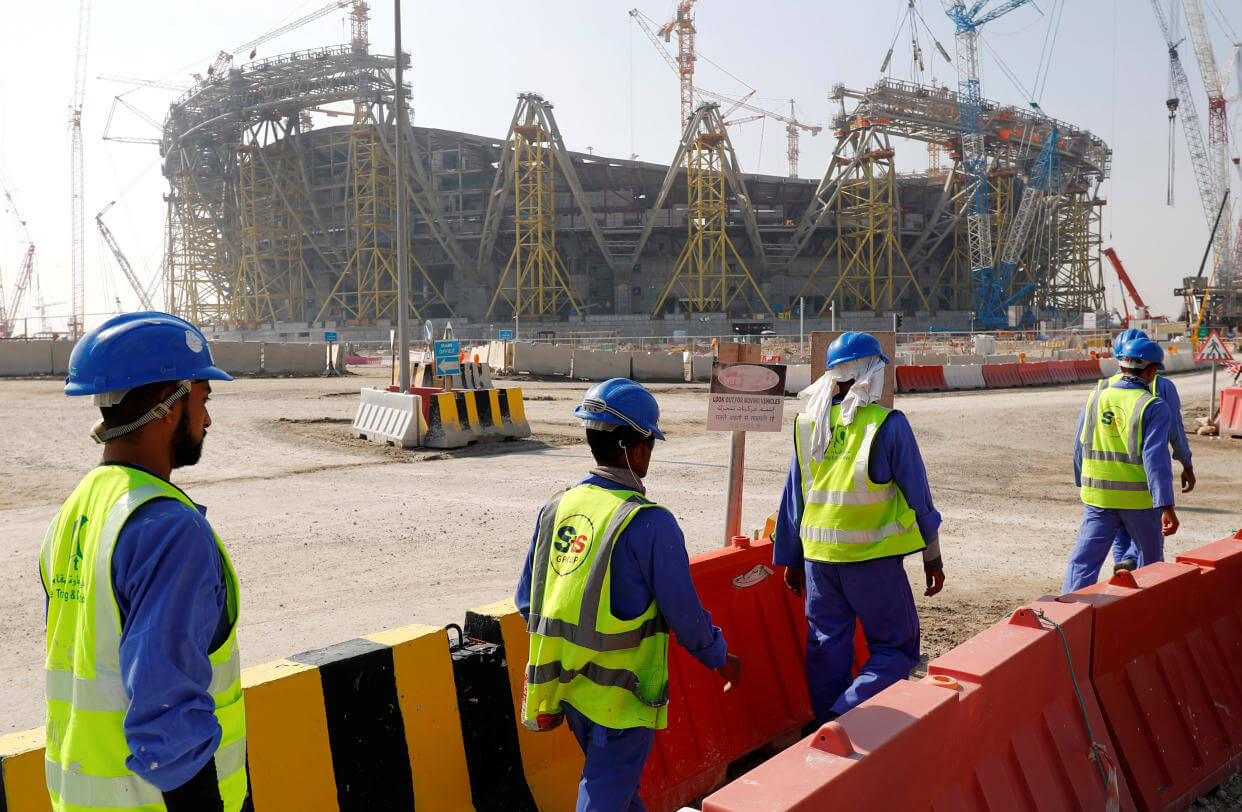Less than three weeks away from hosting the FIFA World Cup, Qatar’s Labour Minister Ali bin Samikh Al Marri refused to create a new compensation fund for migrant workers killed or injured on its massive infrastructure projects, accusing its critics of “racism.”
Human rights groups like Amnesty International and Human Rights Watch have demanded that FIFA and Qatar establish a $440 million fund for workers, equivalent to the World Cup prize money. FIFA admitted that it is an “ongoing dialogue,” noting that it had contributed to “legacy funds” to former World Cup hosts—South Africa ($100 million), Brazil ($100 million), and Russia ($60 million).
According to @AFP interview, Qatari Labour Minister Ali bin Samikh Al Marri claimed a migrant worker compensation fund would be: 1) "duplicative" of @MOLQTR existing compensation efforts; 2) lacks "criteria" & data to be established; 3) Qatari reforms are not acknowledged. pic.twitter.com/SHQib8rqDQ
— Michael Page (@MichaelARPage) November 2, 2022
Marri, however, has called calls for a new fund a “publicity stunt.” He asserted, “There is no criteria to establish these funds,” as Doha had already spent millions in unpaid salaries to workers. He also said that the existing scheme would help workers who had suffered.
Amnesty International official Steve Cockburn called Marri’s stance “hugely disappointing,” saying, “The vast majority of migrant workers who have now returned home to countries like Nepal or Bangladesh are unable to access Qatar’s current scheme.” He thus said Doha “must expand its existing compensation funds or establish a new one.”
Since Qatar won the bid to host the football World Cup in 2010, it has faced increasing criticism for the abominable working conditions of migrant workers, LGBTQ freedoms, and women’s rights. According to Marri, critics have used “false information” and “rumours” to “discredit Qatar with deliberately misleading claims,” and completely disregarded the reforms enforced since 2017 with the help of the International Labour Organization (ILO) and unions.
“They know very well about the reforms that have been made, but they don’t acknowledge it because they have racist motivations,” he stated, adding, “They don’t want to allow a small country, an Arab country, an Islamic country, to organise the World Cup.”
Why is #Qatar opposing a compensation fund for migrant workers & their families for death/abuses building #Qatar2022 infrastructures?
— Claudio Francavilla (@ClaFrancavilla) November 3, 2022
❌ Recent reforms are sufficient
❌ There is not enough data
✔️ It doesn't want to
Up to @FIFAcom to remedy this shame: https://t.co/x74nj56Zjn pic.twitter.com/Pcho9AhQh0
For their book titled ‘The Oil Man’s Slaves,’ French journalists Sébastian Castelier and Quentin Muller gathered 60 testimonies from migrants who had worked in building the World Cup infrastructure in Qatar. They described the experience as a “living hell,” with long 18-hour days in Qatar’s scorching heat, bad water quality, crowded housing, and people dying in accidents due to lack of training or because of exhaustion.
“It’s like a disposable workforce,” Castelier remarked, adding, “It’s impossible for an immigrant to obtain local citizenship. So when they’re no longer working, they have to leave.” He also spoke about the exploitative ‘kafala system,’ which empowers the employees in charge of the migrants and would confiscate their passports often upon arrival. Although Qatar abolished the system in 2016, employers could still take unfair advantage of employees by terming them as “fugitives.”
“There’s a sense of total impunity. Employers know that all they have to do is to send the migrants back to their countries of origin and they’ll never hear from them again,” Castelier argued.
Marri, on the other hand, claimed that since the kafala system was abolished, about 420,000 workers have been able to change jobs. He said $320 million was spent this year on workers who had their salaries stolen by companies, with unpaid salaries being the biggest complaint of migrant workers.
“If a salary payment is delayed for one month, we will pay from the fund and take action,” he stated, adding that owners of blacklisted companies have been fined and jailed. About 42 recruitment agencies have been shut down, five tribunals to hear complaints set up, and additional inspections ordered during the World Cup.
A message from the Socceroos. pic.twitter.com/Sd2R6ej8kK
— Subway Socceroos (@Socceroos) October 26, 2022
While Human Rights Watch group acknowledged the important reforms, it said they came too late, were narrow in scope, or were weakly enforced, and thus were not helpful to a countless number of migrants who had worked on World Cup infrastructure.
According to an article from the Guardian in 2021, over 6,500 migrant workers from India, Pakistan, Nepal, Bangladesh, and Sri Lanka had died in Qatar in a decade. Qatar’s World Cup organising committee’s CEO Nasser Al-Khater called it “extremely unfair.” Marri, too, has cast doubt on the figures, asking, “Where are the victims, do you have names of the victims, how can you get these numbers?”
Omg, this is grim. LGBT people aren't safe in Qatar and the World Cup shouldn't be taking place there https://t.co/kR0gMAOlAh
— Alison Killing (@alisonkilling) November 3, 2022
HRW, on the other hand, insists that Qatari authorities are hiding these numbers. In fact, some experts believe the number of migrant worker deaths associated with the FIFA World Cup to be much higher, since the Guardian report did not take African migrant workers into account, many of whom came from Kenya and Sudan.
Last week, thousands of migrants were evicted from their living quarters in Doha with less than a two-hour notice in anticipation of tourists who will be attending the World Cup later this month. A Qatari government official said the decision was not related to the World Cup but instead “in line with ongoing comprehensive and long-term plans to re-organise areas of Doha.” “All have since been rehoused in safe and appropriate accommodation,” he reassured.

